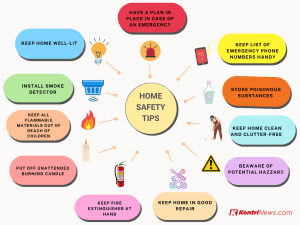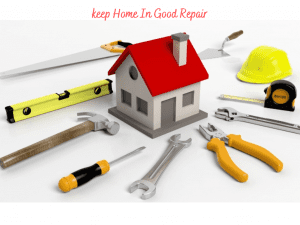11 Home Safety Tips to Keep Your Family Safe

Every day, families around the world face challenges and dangers. While some dangers may be out of our control, there are many things we can do to help keep our families safe. In this blog post, we will discuss some basic home safety tips that can make a big difference in your family’s safety. Read on!
What Is Home Safety
home safety is taking the time to inspect your home’s surroundings for hidden hazards that might increase the chance of Slips and falls, injury, house fires, carbon monoxide poisoning, misadventure burns, and various injuries or even death that can be caused by typical dangers in residence.
Why Are home safety tips important?
In 2020, an estimated 156,300 preventable injury-related deaths occurred in homes and communities in the United States.
your home should be a haven for you and your family. But sadly, accidents can happen anywhere, even in the comfort of your own home. That’s why it’s important to be extra vigilant and take note of these home safety tips and put all preventive measures in place in cases of unforeseen events so you can live safely and happily with your family at home.
Useful Home Safety Tips
- Keep your home well-lit both inside and out.
- Install working smoke and carbon monoxide detectors
- Keep all flammable materials out of reach of children
- Never leave burning candles unattended
- Keep a fire extinguisher on hand and know how to use it
- Keep your home in good repair
- Be aware of potential hazards in your home
- Keep your home clean and clutter-free
- Store poisonous substances
- Keep a list of emergency phone numbers handy
- Have a plan in place in case of an emergency
1) Keep your home well-lit both inside and out
Home lighting plays an important role in security. A well-lit home is less likely to be targeted by criminals, as it is more visible and therefore more likely to be noticed. criminals are less likely to want to break into a home that is well lit. Homes that are not well-lit are more likely to be broken into, as criminals can more easily hide in the darkness.
There are a few things to keep in mind when it comes to home lighting and security. First, it is important to make sure that the outside of the home is well-lit. This means that all doors and windows should have adequate lighting. It is also important to ensure that any vulnerable areas, such as backyards or garages, are also well lit. This will make it more difficult for criminals to hide and will make it easier for neighbors or passersby to notice if something suspicious is going on.


2) Install working smoke and carbon monoxide detectors
One of many useful home safety tips is installing working smoke and carbon monoxide detectors, they’re a vital part of keeping your home safe. By alerting you to the presence of smoke or carbon monoxide, they give you the chance to get to safety before it’s too late.
Smoke detectors are usually located in hallways and bedrooms, where they can make the best sense of the presence of smoke. Carbon monoxide detectors are usually placed near potential sources of carbon monoxide, such as furnaces and water heaters.
When choosing detectors, look for ones that are UL-listed and have a battery backup. You should also test your detectors monthly to ensure that they’re working properly.
By following these simple tips, you can help keep your home safe from fire and carbon monoxide.
3) Keep all flammable materials out of reach of children
One of the most important things you can do to keep your home safe from fire is to keep all flammable materials out of the reach of children. This includes things like matches, lighters, candles, and anything else that can easily catch fire. By keeping these things out of reach, you can help prevent accidents and keep your family safe.
4) Never leave burning candles unattended
When it comes to fire safety, one of the most important things you can do is make sure that any burning candles are never left unattended. If you leave a room where there is a lit candle, be sure to extinguish the flame before you go. This may seem like a no-brainer, but unattended candles are one of the leading causes of house fires.
Another way to keep your home safe from fires is to be mindful of where you place candles. Avoid putting them on surfaces that can catch fire easily, like rugs or curtains. Instead, opt for a stable surface like a table or shelf. And always make sure candles are placed away from any flammable materials.
5) Keep a fire extinguisher on hand and know how to use it
One of the best ways to keep your home safe is to have a fire extinguisher at hand and know how to use it. Fire extinguishers can help put out small fires before they have a chance to spread, and knowing how to use one could potentially save your life.
If you don’t already have a fire extinguisher, you can purchase one at most hardware stores. Be sure to get one that is appropriate for the types of fires that are most likely to occur in your home. For example, if you have a lot of electrical equipment, you may want to get a Class C fire extinguisher.
Once you have your fire extinguisher, make sure to read the instructions so that you know how to use it properly.
6) Keep your home in good repair
Home safety guides are important for many reasons, Not only can accidents happen in the home, but fires and other disasters can occur as well. Keeping your home in good repair can help to prevent these accidents and disasters from happening.
There are a few things you can do to keep your home safe. First, make sure to regularly check your smoke detectors and replace the batteries as needed. Second, keep your home clean and free of clutter to help prevent trip and fall accidents. Finally, be sure to repair any broken or damaged items in your home to help prevent accidents.
By taking these simple steps, you can help to keep your home safe and accident-free.
7) Be aware of potential hazards in your home
One of the best ways to keep your home safe is to be aware of potential hazards. By being aware of potential dangers, you can take steps to prevent them. Here are some potential hazards to be aware of in your home:
-Electrical cords: Exposed electrical cords can be a tripping hazard. Be sure to tuck away cords and keep them out of high-traffic areas.
-Rugs and mats: Rugs and mats can also be a tripping hazard. Be sure to secure them to the floor or remove them altogether.
–Flammable materials: Be aware of flammable materials in your homes, such as cleaning products, gasoline, and propane. Store these items safely and out of reach of children.
-Pools and hot tubs: Pools and hot tubs can be a drowning hazard. Be sure to keep them fenced in and supervise children when they are using them.
-Gun safety: If you have guns in your home, be sure to store them safely and out of reach of children.
By being aware of potential hazards in your home, you can help keep your family safe.
8) Keep your home clean and clutter-free
One of the best ways to help keep your home safe is by keeping it clean and clutter-free. A clean and organized home is less likely to have accidents, and if an accident does happen, it will be easier to spot and fix.
Another reason to keep your home clean is that it can help to prevent fires. A cluttered home is more likely to have items that can catch fire, and if a fire does start, it will be harder to put out.
So by keeping your home clean and clutter-free, you’ll also have peace of mind knowing that your home is safe.
9) Store poisonous substances
Another way that storing poisonous substances safely can help improve home safety is by reducing the risk of fires. Many household chemicals are highly flammable, and if they are not stored properly, they can pose a serious fire hazard. By keeping these substances in a safe, secure location, you can help to prevent accidental fires.
10) Keep a list of emergency phone numbers handy
Some important emergency phone numbers to include on your list are:
- the police
- fire department
- Ambulance service.
- The local poison control center
- Your Doctor or hospital
In addition to emergency phone numbers, it is also a good idea to keep a list of important personal information on hand. This can include your full name, address, birth date, and Social Security number. This information can be used to help identify you in case of an emergency.
11) Have a plan in place in case of an emergency
When an emergency strikes, it’s important to have a plan in place so that everyone in the household knows what to do. Having a plan can help ensure everyone’s safety and make the situation less chaotic.
Some things to consider when creating an emergency plan:
- Choose a safe meeting place outside of the home in case of fire, flood, or another disaster.
- Make sure everyone in the household knows how to reach each other by phone or text in case you are separated.
- Plan for what to do with pets in case of an evacuation.
- Know where the home’s gas and water shutoffs are located and how to turn them off.
- Have an emergency kit prepared with supplies like food, water, first-aid supplies, and a flashlight.
By taking the time to plan ahead, you can help keep your family safe in the event of an emergency.
With this Home Safety Guide, you and your family will be much safer
Taking a few simple precautions can help keep your family safe in the event of an emergency.
By installing working smoke and carbon monoxide detectors, keeping all flammable materials out of reach of children, and having a fire extinguisher on hand, you can make sure that you are prepared for any potential emergencies.
In addition, be sure to keep your home in good repair and well-lit both inside and out. Keeping your home clean and clutter-free can also help reduce the risk of accidents.
Make sure to store poisonous substances safely away from children, and have a list of emergency phone numbers handy so you can quickly summon help if needed. Most importantly, have a plan in place so that everyone knows what to do in case of an emergency. With these home safety tips in mind, you can rest assured knowing that your family is well protected.
Hope this was Helpful.
Read more of Our Articles: 9 Tips To Stay Productive At All Times









